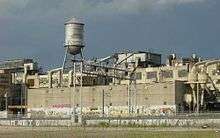Gates Corporation
Gates Corporation, based in Denver, Colorado USA, is a manufacturer of power transmission belts and a manufacturer of fluid power products. The company’s products are used in diverse industrial and automotive applications where the cost of failure is very high relative to the cost of the products. The company employs over 14,000 staff and has sales and manufacturing operations in all of the world's major markets, including North and South America, Europe, Asia, Australia, and the Middle East.
On October 1, 1911, Charles Gates Sr. purchased the Colorado Tire and Leather Company located in Denver, Colorado beside the South Platte River. He paid $3,500 for a property that would one day become one of the world's largest manufacturers of power transmission belts and a leader in hydraulic and fluid power products for industrial and automotive products.[1]
Colorado Tire and Leather Company made a single product, the Durable Tread, a steel-studded band of leather that motorists attached to tires to extend their mileage. In 1917, the company began phasing out leather in favor of rubber and Charles Gates changed its name to the International Rubber Company.
That same year, John Gates, Charles's brother, developed a belt made of rubber and woven threading called a V-belt, due to its shape. It replaced the hemp and rope belt used on automobiles and industrial machinery at the time, and was a model for the common serpentine belt. The belt's success propelled the company to become the largest manufacturer of V-belts, a title it still holds.[2]
In 1919, the International Rubber Company changed its name to the Gates Rubber Company. Gates continued its expansion across the United States, opening more factories and hiring thousands of people. Then, in 1954, its first international manufacturing facility was built in Brantford, Ontario, Canada. Expansion to other countries followed. In 1958, the company opened Gates Rubber de Mexico. In 1963, Gates built a belt and hose plant in Erembodegem, Belgium, the first of many European facilities.[3]

In the 1980s, Gates expansion continued when the company acquired the Uniroyal Power Transmission Company and became the world's largest synchronous/timing belt manufacturer, firmly establishing its growth path in the Asia-Pacific region.[4]
In 1996, the company was acquired by the British-based engineering firm, Tomkins plc, ending 85 years of family ownership.[5] In 2003, Gates changed its name to The Gates Corporation, a move reflecting the company's expanding range of industrial brands, product lines, and customers. The Denver factory closed, and by 2001, some buildings hadn't been used in nearly a decade. Asbestos contaminated the buildings and Trichloroethylene in the groundwater is still under remediation in late 2014. While parts of the property had been redeveloped, the original factory sat deserted on the corner of Broadway and Mississippi until November 2013, when demolition of the final factory buildings began. The site was purchased by Denver-based Frontier Renewal in September 2014 and will complete the cleanup of the former 41-acre Gates Rubber Co. plant site and prepare it for future development.[6][7]
In 2011, The Gates Corporation celebrated its centennial with events around the world and launched a new global brand initiative, adopting the new corporate tagline: "Powering Progress".[8]
In July 2014, The Blackstone Group, the world’s largest buyout firm, agreed to acquire The Gates Corporation from Onex Corp. (OCX) and Canada Pension Plan Investment Board for $5.4 billion.[9] The company's headquarters are located at the 234,264 sq.ft building at 1551 Wewatta St in Denver, Colorado.[10]
Global Markets
Gates designs and manufactures industrial belt, hose, and hydraulic products for a wide range of industries in several global markets.
- Energy, Exploration & Extraction: Gates provides products and services for the energy, marine, mining, oil and gas, and oil refining industries.
- Infrastructure & Agriculture: Gates solutions cover heavy-duty applications, including construction, agriculture, logging, and material handling.
- Transportation: Gates provides new build and replacement products for fleet and heavy-duty vehicles, freight, towables, and rail applications.
- Automotive: Gates manufactures OEM quality automotive aftermarket products for cars, light trucks, and snowmobile, sport, fleet, and heavy-duty vehicles.
- Bicycles: Gates Carbon Drives serve as a low-maintenance replacements for bicycle chains.[11]
- Process & Specialty: Gates hoses and belts can be found on everyday products, including those used in homes, offices, laboratories, food processing plants, and in other every day products.
See also
References
- ↑ "Gates Corporation Introduces POWERCLEAN™ Flush Tool and Launches Automotive Cooling System Maintenance Awareness Campaign". Retrieved 2012-05-16.
- ↑ "Gates Corporation History". Retrieved 2012-05-16.
- ↑ "100 Years of Powering Progress" (PDF). Retrieved 2012-05-16.
- ↑ "Uniroyal to Sell Unit to Gates". The New York Times. 1986-05-22. Retrieved 2012-05-16.
- ↑ Grimond, Magnus (1996-01-31). "Tomkins Finalises Gates Acquisition at Pounds 768m". The Independent. London. Retrieved 2012-05-16.
- ↑ "Denver brownfields developer Frontier Renewal buys former Gates plant". Denver Post. 2014-09-15.
- ↑ "Gates: Broadway rubber plant demolition to take a year", Denver Business Journal, 2013, retrieved 2014-04-14
- ↑ "Gates Corporation Celebrates 100th Anniversary". Retrieved 2012-05-16.
- ↑ Banerjee, Devin (2014-04-04). "Blackstone Agrees to Buy Gates Global in $5.4 Billion LBO". Bloomberg.
- ↑ "Legacy Plaza". CrediFi. Retrieved 19 September 2016.
- ↑ Caitlin Giddings (September 24, 2015). "The Gates Carbon Belt Drive Is Coming for Your Chain". Bicycling. Retrieved 2017-06-12.
External links
- Gates Corporation home page